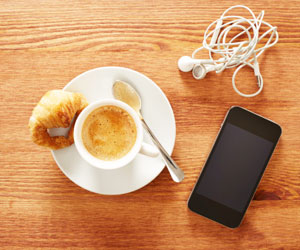How Your Smartphone Can Affect Your Well-Being
 Volkswagen turns off some workers’ email 30 minutes after quitting time. BMW is instituting new rules that will guard employees from being contacted after working hours.
Volkswagen turns off some workers’ email 30 minutes after quitting time. BMW is instituting new rules that will guard employees from being contacted after working hours.
In fact, an increasing number of companies have created similar rules, according to a survey by the Society for Human Resource Management (SHRM). Employers appear to be recognizing, after years of freely contacting workers on their smartphones at any time of the day or night, that employees need to be able to escape from work.
“It’s not unusual in telework circumstances that a manager will call or send e-mails when an employee is supposed to be off the clock, and it’s only human nature to want to respond to these messages as quickly as possible,” Ken Matos, a research director at the Families and Work Institute in New York City, recently told SHRM senior writer Bill Leonard.
A new psychological study signals that many people who use their smartphones for work-related communications tend to have a difficult time psychologically detaching from their jobs. This, in turn, makes them vulnerable to work-related exhaustion.
But interestingly, some people appear to lighten their job stress the more they use their smartphones, the study shows.
Daantje Derks, Heleen van Mierlo, and Elisabeth B. Schmitz of Erasmus University Rotterdam theorized that intensive work-related smartphone use during the evening — fueling and implicit demand for 24/7 availability — disturbs a person’s ability to psychologically disengage from the stress of the job.
“The increased productivity associated with staying connected to work in the evening hours is often achieved at the cost of mental health, yielding higher stress levels which may lead to poor recovery, impaired performance, fatigue, and sleep complaints,” they write in the Journal of Occupational Health Psychology.
To validate their theory, Derks and colleagues contacted professionals from four different sources — an executive search firm, a strategic management consultancy, a large energy company, and their own personal contacts — and asked them to evaluate their work. Specifically, each volunteer filled out a survey on four consecutive workdays. On the questionnaire, participants rated how much they feel compelled to check messages on their smartphones when at home, how much they are able to forget about work at the end of the day, and what level of work-related stress and exhaustion they experience. They also rated the degree of their overall workload and the level of off-hour demands that their jobs placed on them.
Derks and his collaborators expected that people who were accustomed to clear work/home boundaries would experience the biggest detachment difficulties as a result of heavy smartphone use. And that’s exactly what they found. Participants who characterized their jobs as having a strict line between work and home showed more difficulty mentally escaping from work the more they used their smartphones.
“This probably occurs because the smartphone brings their work into the home domain, and they were not used to that,” the researchers write.
Meanwhile, the people who said they normally experience their work spilling over into their home life were better able to detach from the job on the days they used their smartphones most intensively. Derks and his colleagues propose that these employees may worry more when they can’t attend to the job while working from home. The smartphone, in effect, buffered their preoccupation with work. Thus, policies like Volkswagen’s, which would prevent them from checking work email on evenings and weekends, might make them even more preoccupied with job issues rather than help them detach.
The scientists acknowledge some shortcomings in their study. They did not, for example, account for the overall time that each study participant dedicated to work at home, aside from their use of their smartphones.
They say further research should assess how much of the detachment difficulties, and consequential work exhaustion, stem from the employee’s personality traits as opposed to the employer’s expectations. Some smartphone users, they note, may have trouble managing a healthy separation of work and personal time, regardless of what accessibility demands their employers place on them.
“Employers should be careful in creating expectations regarding availability when they decide to provide smartphones to their employees,” the researchers conclude. “One way to deal with this is to make employees aware of the potential pitfalls of work-related smartphone use.”





APS regularly opens certain online articles for discussion on our website. Effective February 2021, you must be a logged-in APS member to post comments. By posting a comment, you agree to our Community Guidelines and the display of your profile information, including your name and affiliation. Any opinions, findings, conclusions, or recommendations present in article comments are those of the writers and do not necessarily reflect the views of APS or the article’s author. For more information, please see our Community Guidelines.
Please login with your APS account to comment.